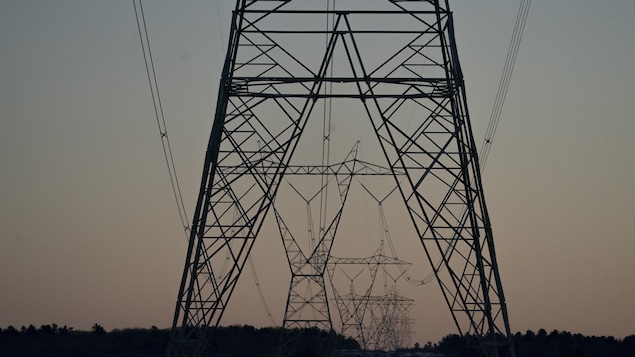The Appalachian-Maine Connection Line must extend more than 233 kilometers in Maine and must carry 9.45 TWh annually to Massachusetts. The project will reduce greenhouse gases by 3 million tons, the equivalent of taking 700,000 cars off the road.
However, the climate argument did not convince major environmental associations in Maine opposing the project. Anya Fischer, Maine’s director of environment, is concerned that the nearly 85-kilometre stretch that runs through the Northwoods forest could disturb plants and animals.
She explains that it is a valuable ecosystem and is an important place for Mainoa. People live and visit Maine because of the beauty of its nature. We need to protect this sector.
Ms. Fisher does not consider hydropower to be a source of green energy, especially because of the impact of dam building. She had hoped that the $1 billion invested in the project would instead be used to deploy solar and wind energy.
At Central Maine Power (CMP), which is building the interconnector south of the border, solar and wind are not as reliable sources of energy as hydropower. It would take 10 times as many trees to install a wind and solar farm that produces the same amount of energy.
Ms. Fisher is not alone in opposing the project. This is particularly the case with the Maine Natural Resources Council (NRCM) and Sierra Club Maine. Their position is not unanimous in the ecological community, but the opponents are more crowded. Organizations identified by several sources as being supportive of the project did not respond to our calls or told us that they had not taken an official position.
The opposition of his colleagues grieves Tom Rampf, a retired ecologist who worked for 21 years at the Nature Conservancy in Maine. The project is not perfect, as he admitted in an interview at his home.
There are sacrifices to be made, I’m aware of, but overall I think they will help decarbonize New England electricity.
The line has won the support of regulatory authorities after an in-depth analysis of the environmental impacts, he said. It is believed that its effect on plants and animals will be minimal. He gives as an example the fear of overheating the waterways that serve as a habitat for trout. While it is true that streams will warm below the line due to a lack of shade, they will cool quickly, as they are fed by cool groundwater currents, he explains.
disinformation campaign
But the nuances of the project are lost in this polarizing campaign, regrets Mr. Rampf. Notably, various lobbyists spent a total of $94 million to influence voters, according to documents submitted to the Maine Ethics Commissioner consulted by the Canadian Press. This is a record amount for a referendum in the state.
Officially, the groups supporting the project spent almost three times the money of the opponents. Those numbers may not give a complete picture, as the Stop the Corridor group is locked in a legal battle with the commissioner to keep donors anonymous.
Lots of misinformation is circulating in this campaign. In this field, we have heard more than once that Hydro-Québec is engaged in coal and fossil fuels. Crown owns about 20 Small
Thermal power plants serve the remote areas of the Far North. A spokeswoman for Lynn Saint Laurent explains that these factories are not connected to her network. For its part, the Bikankur gas plant is used only during peak periods.
I also heard we were in coal, I don’t know where it came from
, mentions Mrs. Saint Laurent.
For its part, the opposition’s largest financial contributor, NextEra, was presented as a big oil
Opposition to hydropower. In fact, the company is one of the largest producers of wind and solar energy. Its thermal power plant in Maine operates irregularly, during backup periods.
However, the Hydro-Quebec line will compete with the nuclear power plant in New Hampshire, with less expensive electricity. The Florida company spent more than $20 million encouraging voters to block its Quebec competition. Energy producers Calpine and Vistra are also trying to undermine the project and have spent 2.7 million and 2.8 million, respectively.
Opposition to the project, Richard Bennett, Republican senator, regrets the arguments silly
Presented by the Mainers for Fair Laws group, which focuses on conservative voters’ fear of omnipotent government. The group, indirectly financed to the value of 11.9 million by CMP, He asserted that voting against the bill would open a legal loophole that would allow elected officials to remove firearms from owners. It is an interpretation rejected by a number of independent jurists.
It is an insult to the intelligence of the citizens, the senator protests. The most unusual arguments are traded at the end of the campaign.
The group’s spokesperson did not return our call. Note that Hydro-Québec did not contribute financially.
$21.9 million spent by Hydro-Quebec annoys the senator. Along with his colleagues in the Senate and House of Representatives, Bennett voted overwhelmingly for a law banning foreign entities, such as Hydro-Quebec, from campaigning funding in Maine. Democratic Governor Janet Mills vetoed last June, saying she could prevent domestic companies with foreign shareholders from participating in the democratic process.
Hydro-Québec considers that the expenses incurred legally are justified to explain the merits of the project.
Ms. St-Laurent explains: We are running a media campaign because of the obscene misinformation circulating about our energy and the project. Of course, we will defend the quality of our energy.

“Music guru. Incurable web practitioner. Thinker. Lifelong zombie junkie. Tv buff. Typical organizer. Evil beer scholar.”








More Stories
PlexCoin debacle: Crown demands 50 months in prison and $6.8 million fine for Dominique Lacroix
Bad Joke : He is harassed by a prankster who doubles pizza orders in his name
South Korea's transportation system 'makes Quebec mayor dream'